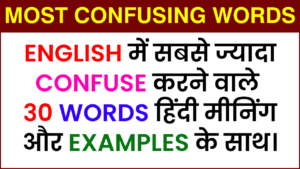![]()
1000 Commonly Confused Words pdf
Table of Contents
In this post, I am sharing with you the first part of 1000 Commonly Confused Words pdf. Here are some pairs of verbs that are often confused, along with their detailed explanations in English and Hindi. These verb pairs can often lead to confusion due to their similar spellings or meanings. Understanding their distinctions is crucial for using them correctly in English and Hindi.
Commonly Confused Words
1. Accept vs. Except:
– Accept: To receive willingly or agree to something. (स्वीकार करना)
– Except: To exclude or leave out. (छोड़ना)
Explanation: “Accept” means to receive or agree to something, while “except” means to exclude or leave out something or someone.
2. Affect vs. Effect:
– Affect: To influence or have an impact on something. (प्रभावित करना)
– Effect: A result or consequence. (प्रभाव)
Explanation: “Affect” is a verb that means to influence or have an impact on something, while “effect” is a noun that refers to a result or consequence of something.
3. Complement vs. Compliment:
– Complement: To complete or enhance something. (पूरक होना)
– Compliment: To praise or express admiration. (तारीफ करना)
Explanation: “Complement” means to complete or enhance something by adding to it, while “compliment” means to praise or express admiration for someone or something.
4. Lay vs. Lie:
– Lay: To place or put something down. (रखना)
– Lie: To recline or be in a resting position. (आराम करना)
Explanation: “Lay” is a transitive verb and requires an object. It means to place or put something down. On the other hand, “lie” is an intransitive verb and does not take an object. It means to recline or be in a resting position.
5. Ensure vs. Insure:
– Ensure: To make certain or guarantee something. (सुनिश्चित करना)
– Insure: To provide financial protection against loss or damage. (बीमा कराना)
Explanation: “Ensure” means to make certain or guarantee something will happen or be the case. On the other hand, “insure” means to provide financial protection through an insurance policy.
6. Advise vs. Advice:
– Advise: To give counsel or offer guidance. (सलाह देना)
– Advice: A noun that refers to recommendations or opinions given to someone. (सलाह)
Explanation: “Advise” is a verb that means to give counsel or offer guidance. On the other hand, “advice” is a noun that refers to recommendations or opinions given to someone.
7. Desert vs. Dessert:
– Desert: To abandon or leave someone or something. (त्याग करना)
– Dessert: A sweet dish served after a meal. (मिठाई)
Explanation: “Desert” is a verb that means to abandon or leave someone or something. On the other hand, “dessert” is a noun that refers to a sweet dish served after a meal.
8. Borrow vs. Lend:
– Borrow: To take something temporarily with the intention of returning it. (उधार लेना)
– Lend: To give something temporarily to someone. (उधार देना)
Explanation: “Borrow” means to take something temporarily with the intention of returning it. On the other hand, “lend” means to give something temporarily to someone.
9. Lose vs. Loose:
– Lose: To be deprived of something or fail to keep possession of it. (खोना)
– Loose: Not tight or firmly fixed. (ढीला)
Explanation: “Lose” means to be deprived of something or fail to keep possession of it, while “loose” means not tight or firmly fixed.
10. Principal vs. Principle:
– Principal: The head or leader of a school or organization. (मुख्याध्यापक / प्रधान)
– Principle: A fundamental truth or guiding belief. (सिद्धांत)
Explanation: “Principal” refers to the head or leader of a school or organization, while “principle” refers to a fundamental truth or guiding belief.
1000 Commonly Confused Words Pdf Download
11. Bring vs. Take:
– Bring: To carry or convey something to a place where the speaker or subject is. (लाना)
– Take: To carry or convey something away from the speaker or subject to another place. (ले जाना)
Explanation: “Bring” is used when the movement is toward the speaker or subject, while “take” is used when the movement is away from the speaker or subject.
12. Ensure vs. Insure:
– Ensure: To make certain or guarantee something. (सुनिश्चित करना)
– Insure: To provide financial protection against loss or damage. (बीमा करना)
Explanation: “Ensure” means to make certain or guarantee something will happen or be the case. On the other hand, “insure” means to provide financial protection through an insurance policy.
13. Hear vs. Listen:
– Hear: To perceive sounds with the ear. (सुनना)
– Listen: To pay attention and make an effort to hear something. (सुनना / ध्यान देना)
Explanation: “Hear” refers to perceiving sounds with the ear, while “listen” implies actively paying attention and making an effort to hear something.
14. Do vs. Make:
– Do: To perform an action or task. (करना)
– Make: To create, construct, or produce something. (बनाना)
Explanation: “Do” refers to performing an action or task, while “make” implies creating, constructing, or producing something.
15. Lay vs. Lie:
– Lay: To place or put something down. (रखना)
– Lie: To recline or be in a resting position. (आराम करना)
Explanation: “Lay” is a transitive verb and requires an object. It means to place or put something down. On the other hand, “lie” is an intransitive verb and does not take an object. It means to recline or be in a resting position.
16. Rise vs. Raise:
– Rise: To move upward or increase in level, position, or importance. (उठना / बढ़ना)
– Raise: To lift or elevate something. (उठाना)
Explanation: “Rise” is an intransitive verb that describes something moving upward or increasing, while “raise” is a transitive verb that involves lifting or elevating something.
17. Farther vs. Further:
– Farther: Refers to physical distance. (दूर)
– Further: Refers to additional or additional advancement. (आगे)
Explanation: “Farther” is used to indicate physical distance or how much more something is from a point of reference. “Further” is used to indicate additional advancement or progress.
18. Learn vs. Study:
– Learn: To acquire knowledge or gain information. (सीखना)
– Study: To focus on a subject or topic with the intention of acquiring knowledge. (अध्ययन करना)
Explanation: “Learn” means to acquire knowledge or gain information through various means. “Study” refers to the act of focusing on a subject or topic with the intention of acquiring knowledge or understanding.
19. Adapt vs. Adopt:
– Adapt: To adjust or modify oneself to new conditions or changes. (अनुकूलित करना)
– Adopt: To legally take someone else’s child as one’s own. (गोद लेना)
Explanation: “Adapt” means to adjust or modify oneself or something to fit new conditions or changes. “Adopt” refers to legally taking someone else’s child as one’s own and becoming their legal parent.
20. Allude vs. Elude:
– Allude: To indirectly refer to or suggest something. (संकेत करना)
– Elude: To escape or avoid capture or understanding. (टाल जाना)
Explanation: “Allude” means to indirectly refer to or suggest something without explicitly stating it. “Elude” means to escape or avoid capture, or to evade understanding or comprehension.
Commonly Confused Words Sentence Examples
21. Advice vs. Advise:
– Advice: A noun that refers to recommendations or opinions given to someone. (सलाह)
– Advise: To give counsel or offer guidance. (सलाह देना)
Explanation: “Advice” is a noun that refers to recommendations or opinions given to someone. “Advise” is a verb that means to give counsel or offer guidance to someone.
22. Bring vs. Fetch:
– Bring: To carry or convey something to a place where the speaker or subject is. (लाना)
– Fetch: To go and bring something from a place to the speaker or subject. (लाने जाना)
Explanation: “Bring” is used when the movement is toward the speaker or subject. “Fetch” implies going to another place and bringing something back to the speaker or subject.
23. Ensure vs. Insure:
– Ensure: To make certain or guarantee something. (सुनिश्चित करना)
– Insure: To provide financial protection against loss or damage. (बीमा करना)
Explanation: “Ensure” means to make certain or guarantee that something will happen or be the case. “Insure” means to provide financial protection through an insurance policy.
24. Remember vs. Remind:
– Remember: To have or keep in mind information from the past. (याद करना)
– Remind: To make someone remember or bring something to their attention. (याद दिलाना)
Explanation: “Remember” is used to describe the action of having or keeping something in mind from the past. “Remind” is used to bring something to someone’s attention or make them remember something.
Learn Vocabulary with Hindi Meaning
Buildings and Their Parts in English with Hindi
Daily Use English Words – Day -1
DAILY USE ENGLISH WORDS WITH HINDI MEANING Day – 2
Basic English Verb Hindi Meaning Day-2
Occupations Names English Hindi Meaning
125 Daily Use English Words with Hindi Meaning
80 Daily Use Words with Hindi Meaning





